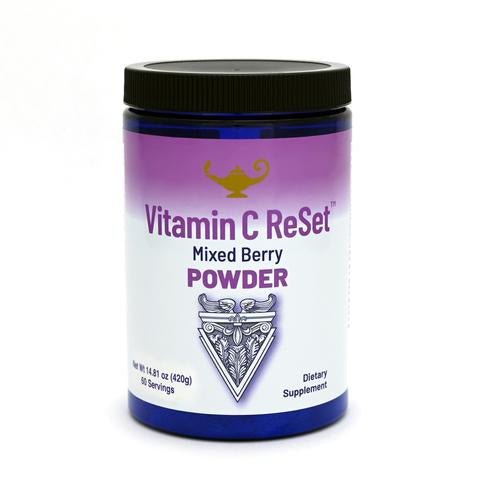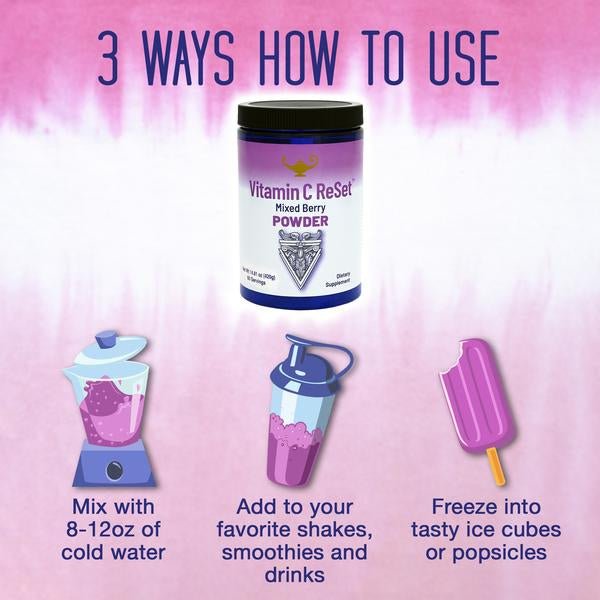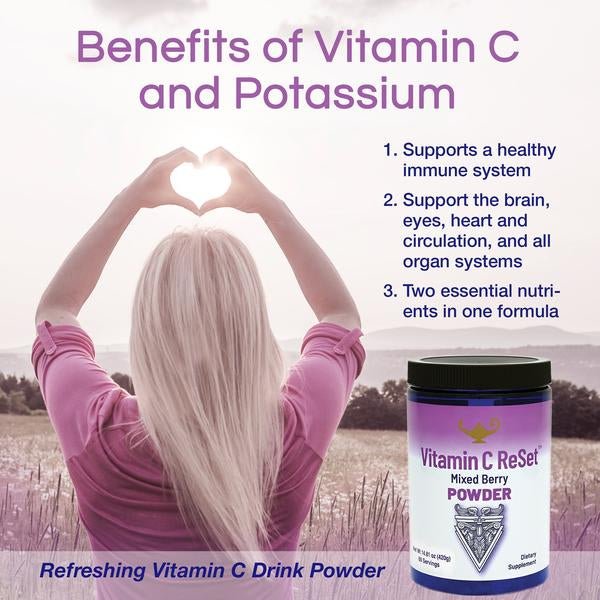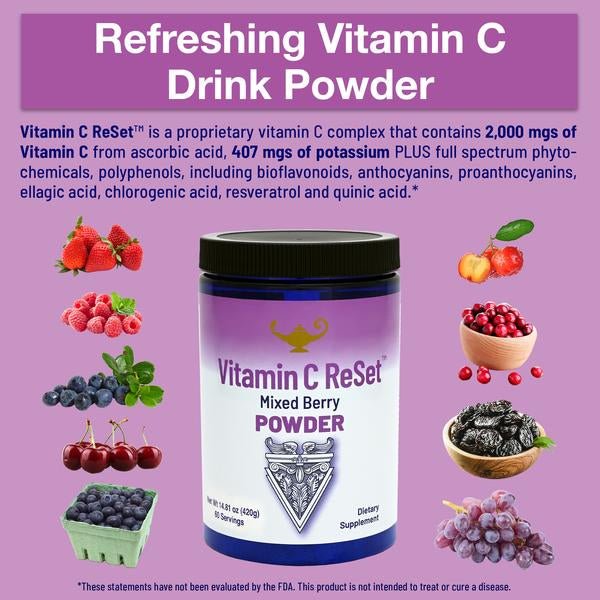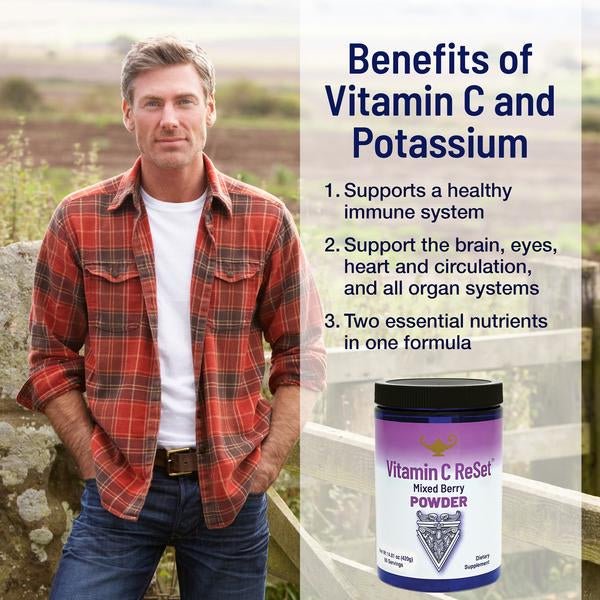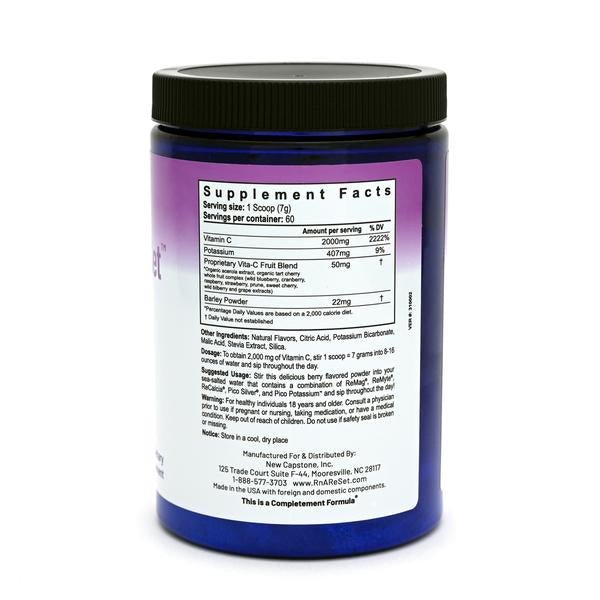Vitamin C ReSet Vitamin C Drink Powder
Vitamin C ReSet Vitamin C Drink Powder Black is backordered and will ship as soon as it is back in stock.
Vitamin C ReSet with berry flavor - Advanced supplement for the immune system
Vitamin C ReSet is a high-dose, tasty and easily absorbable vitamin C supplement in powder form with a natural berry flavour. With 2,000 mg of vitamin C per serving, 407 mg of potassium and a unique blend of fruit and plant extracts, this product is designed to support the immune system, promote collagen formation and protect cells from oxidative stress.
Vitamin C is an essential water-soluble vitamin that the body cannot produce itself. Therefore, it must be supplied through diet or supplements. Vitamin C ReSet can contribute to the following documented health benefits:
• Contributes to the normal function of the immune system
• Protects the cells against oxidative stress
• Supports normal collagen formation for skin, bones, cartilage and teeth
• Increases iron absorption
• Reduces fatigue and exhaustion
• Contributes to normal psychological function
Technical specifications
• Serving size: 7 gram spoon
• Servings per box: 60
• Vitamin C: 2,000 mg per serving
• Potassium: 407 mg per serving
• Contains sprouted barley seed powder and natural fruit complexes
• Powder with natural berry flavor - easy to mix in water or smoothie
• Delivers 2,222% of the recommended daily intake (RDI) of vitamin C
About vitamin C and the immune system
Vitamin C is essential for the production and function of white blood cells, and acts as a strong antioxidant that protects the cells against free radicals. It also plays a role in the production of collagen and promotes wound healing. Studies show that high intake can reduce the duration and severity of colds, especially in people with low vitamin C intake.
Best natural sources of vitamin C in food
• Acerola cherries (½ cup): 822 mg
• Guava (1 pc): 126 mg
• Rose hips (6 pcs): 119 mg
• Raw lemon (1 pc): 83 mg
• Kiwifruit (1 pc): 71 mg
• Kale (1 cup): 80 mg
• Broccoli (½ cup, cooked): 51 mg
• Brussels sprouts (½ cup, cooked): 49 mg
• Orange (1 medium): 70 mg
• Thyme (1 ounce): 45 mg
Instructions for use
Mix one measuring spoon (7 grams) of Vitamin C ReSet in water, juice or smoothie. Can also be combined with ReMag, ReMyte and Dr. Dean's Picometer minerals. The dose can be adjusted according to individual needs. Suitable for the whole family.
Reservation
Food supplements should not replace a varied and balanced diet.
The recommended daily dose should not be exceeded.
Keep out of the reach of children.
Consult a doctor if you are pregnant, breastfeeding or using medication.
Use is at your own risk.
Disclaimer
Uno Vita AS does not claim that this product can cure, treat or prevent disease. The information is intended for informational purposes only and is based on publicly available research and approved health claims.
Freedom of expression and right to information
In accordance with international principles on freedom of expression and the right to share publicly available information, we disseminate scientific findings and product information as a contribution to informed health choices.
References
-
EFSA Panel on Dietetic Products, Nutrition and Allergies (NDA). EFSA Journal 2013.
-
Hemilä H. Vitamin C and infections. Nutrients. 2017.
-
Carr AC, Maggini S. Vitamin C and immune function. Nutrients. 2017.
-
Jacob RA, Sotoudeh G. Vitamin C function and status in chronic disease. Nutr Clin Care. 2002.
-
Institute of Medicine. Dietary Reference Intakes. National Academies Press.
-
Levine M et al. Vitamin C pharmacokinetics. PNAS. 1996.
-
Gombart AF et al. A review of micronutrients and the immune system – working in harmony. Nutrients. 2020.
-
Padayatty SJ, Levine M. Vitamin C: the known and the unknown. CMAJ. 2001.
-
Fowler AA et al. High-dose vitamin C infusion in sepsis. J Transl Med. 2014.
-
Kashi DS et al. Increased fruit and vegetable consumption improves skin colour. PLoS One. 2011.
-
Higdon J, Drake VJ. Linus Pauling Institute, Oregon State University.
-
NCCIH - National Center for Complementary and Integrative Health.
